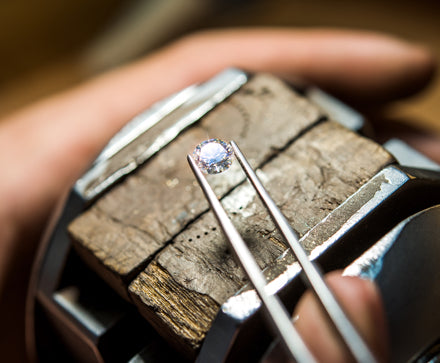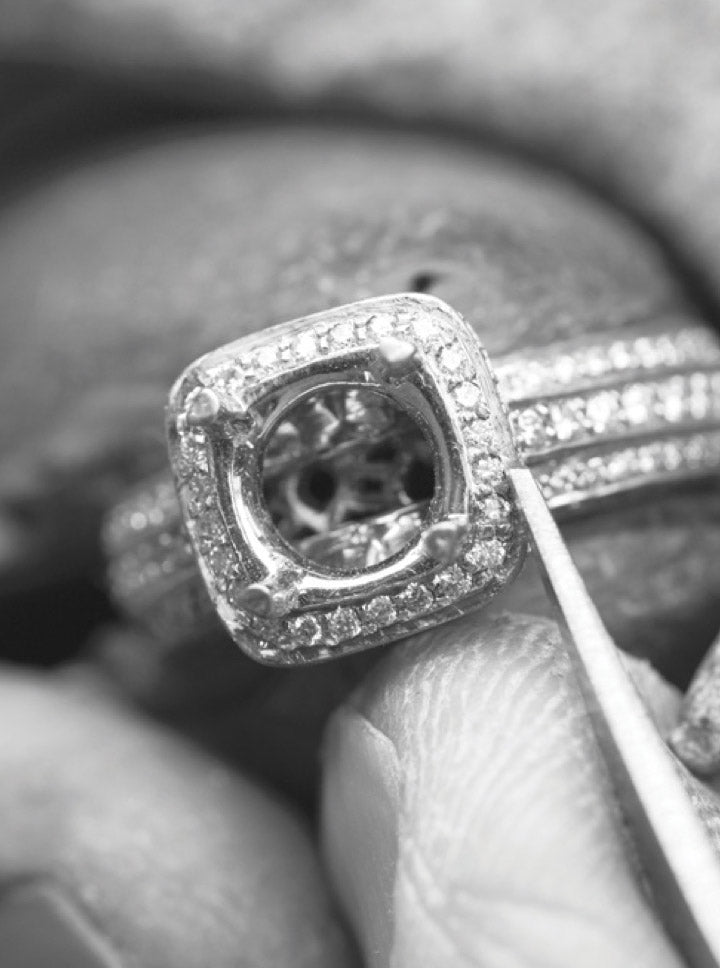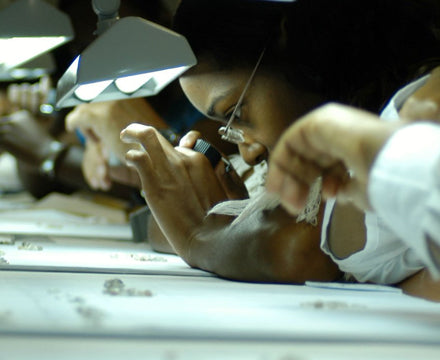Conflict-Free Diamonds

Ritani’s Commitment to Ethical Diamonds
Since our founding in 1999, Ritani has been driving change in the American diamond industry and working to provide full visibility throughout our diamond supply chain - from diamond mine to her engagement ring. Ritani is one of the leading companies in the United States to use the Kimberley Process and upholds strict ethical diamond sourcing standards. By the mid-2000s, consumers had become increasingly aware of the difficult history surrounding diamond mining in Africa. Today, many people still assume that the diamond trade is riddled with violence and corruption. In some cases that is still true, and consumers should be cautious where they buy a diamond. But thankfully, due to a concerted effort from major industry players and the United Nations, a huge amount of progress has been made to ensure an ethical diamond supply chain. Ritani has been part of that work since our founding. |  |
Ritani goes above and beyond to ensure that our diamonds, gems, and precious metals are ethically sourced.
 | The Ritani PromiseNot only do we stringently adhere to ethical standards honoring hard-working people internationally, but our conflict-free engagement rings are handcrafted in the United States, contributing to local economies right here at home. Ritani goes above and beyond to ensure that all of our jewelry supplies — from diamonds to precious metals – are sourced from companies that treat their workers fairly. We carefully select our retail partners, ensuring their commitment to upholding all standards established by the Kimberley Process. Ritani and our retail partners are leaders in the effort to ensure an ethical, conflict-free diamond industry. We carry the torch for a better Africa; with every ring we create, we strive to build wealth back into the myriad diamond communities our company touches, leaving Africa a better place for its people. By choosing to buy a diamond at Ritani, you’ve made a decision to support local economies in Africa and in the United States. You can rest assured that your diamond was mined conflict-free, and that every person who has touched your diamond was treated ethically. |
JKG & RITANI LEADERS INVEST IN AFRICAIt’s impossible to tell the story of Ritani’s diamond sourcing without also talking about Julius Klein Group. JKG, member of the Responsible Jewelry Council and early adopter of the Kimberley Process, was founded in 1948 as a diamantaire in midtown Manhattan. JKG evolved over the course of 60+ years into an American diamond manufacturing powerhouse. When Ritani partnered with JKG to launch an e-commerce platform in 2012, we gave JKG a way to sell their expertly cut conflict-free diamonds online, while they provided Ritani with strategic direction along with a foundation in ethical diamond sourcing. JKG’s ethical sourcing practices help define Ritani’s approach to diamond manufacture and supply. |  |
 | EDUCATION & JOBS IN NAMIBIAHistorically, the African diamond industry took wealth out of the diamond-producing countries: Once the rough diamonds were mined, they were immediately shipped to Europe for the complex work of sorting, cutting and polishing. Because of this exportation, the diamond-producing communities had unstable economies, and the rough diamonds sold for far less than the cut and polished versions did in Europe. Julius Klein Group helped turn that trend around by investing in the economy of Namibia. In 2008, the Julius Klein Group invested $5 million USD to build a factory for sorting and cutting rough diamonds in Windhoek, Namibia’s capital city. This provided stable, better-paying jobs for the people of Windhoek and helped create a more holistic economy supporting diamond production in the country. More than 90 Namibians made up the original workforce in 2008. The factory continues operations as of 2017. Shortly after opening the diamond factory, JKG also began an educational program: They found women and men who had no previous professional skills or experience, and taught them the complex art of diamond cutting. This education allowed the more than 50 program graduates to find work in diamond cutting facilities and provide for their families. Nearly 50% of the graduates were women. Since that time, JKG has donated hundreds of thousands of additional dollars to various human rights needs and groups, including several primary schools and the Moria Grace Orphanage in Namibia. As part owner of Ritani, JKG’s historical dedication to diamond communities is integral to Ritani’s philosophy as well as every element of our day-to-day operations. As we work to bring you the best diamond selection available, we simultaneously work to ensure the fair treatment of those who mined and cut these precious gems. |
GLOBAL EFFORTS ON ETHICAL DIAMOND SOURCINGBy the early 2000s, the diamond industry and stakeholder nations began to recognize the need for change and take action in the global diamond supply chain. In 2003, the United Nations established what is known as the Kimberley Process. The Kimberley Process demands that diamonds originating from member countries may not be used to finance wars or human rights crimes. More than 50 diamond-trading countries, including the United States, currently hold membership in the Kimberley Process agreement. The 2003 initiation of the Kimberley Process marked the beginning of a movement toward greater transparency, accountability and ethical behavior within the diamond industry. |  |
 | Today, reports and statistics from the last 15 years illustrate a drastic change in the industry and its impact on African diamond communities. By 2007, De Beers, the largest diamond mining corporation in the world economy, began publishing reports on the ethical, environmental and societal issues surrounding their global operations. By identifying and publishing these issues, the company opened a dialogue to address problems such as environmental pollution, violations of the Kimberley Process and negative economic effects of their diamond mining. Their ongoing efforts have led to immense improvements in the welfare of diamond communities around the world. In 2016 alone, they spent $24.9 million on social investment projects, and dedicated 164,000 hectares of land to conservation (5 hectares of land for every 1 hectare disrupted by mining). The work of De Beers is significant because of the company’s huge share in the global diamond market. A great number of diamond wholesalers and jewelers get their diamonds from De Beers – they’re the beginning of the supply chain for most within the diamond industry. The past decades of work by industry leaders, nonprofits and the governments of diamond-trading nations have had a tangible positive impact throughout the diamond supply chain. To learn more about the impacts of the Kimberley Process, De Beers, and ethical jewelry nonprofits, explore our resource section below. |
Resources on Conflict-Free Diamonds
The Kimberley Process - Official Website
Responsible Jewelry Council - Official Website


